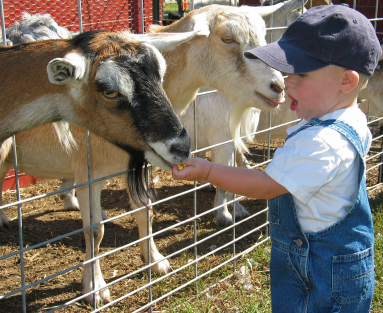While the main purpose of your land probably depends on how much land you have available and what you are particularly talented at cultivating, almost everyone could stand to utilize spare space to bring in some extra income. In such tough economic times, looking beyond traditional means of income is increasingly important.
Petting Zoo
If you have a variety of animals on your land—or you would be willing and able to—consider setting up a small petting zoo. If you live in a remote area surrounded by farms, this may not be a viable option for you, as those around you already likely have experience with the type of animals you could host in a petting zoo. If you live in a moderately well-populated area that is not all farmland, however, this would be an almost effort-free way to make some extra income. All you really need in terms of infrastructure is an enclosure that is secure enough to keep each animal inside, while allowing ample interaction with the visiting children. Goats, chickens, ducks, rabbits, and pigs would all be easy animals to include in one enclosure, perhaps with smaller rabbit cages. If you own any exotic or unusual animals, that would be an interest-drawing focal point of the petting zoo. Each patron would pay a small fee at the gate, and could pay to feed the animals as well. The only real cost would be the enclosure, and it is likely that you could re-purpose supplies or enclosures you already use on a daily basis.
Pick-Your-Own
While picking all the fruit and vegetables that your farm produces may be old news to you, there are plenty of people who would love that opportunity. Peach-picking farms in Kentucky and apple-picking orchards in the Northeast do well for several reasons. The experience lets people feel as if they have played a role in producing the finished product: they did not simply buy peaches at the store; they hand picked them! The process also saves money for the farmer and the consumer. You do not have to pay to transport your fruit crops to be sold, and the consumer does not encounter the higher ticket price that results from processing and shipping. These types of farms are particularly successful if you house a particular fruit or veggie that nobody else in your area sells, if you have a seasonal specialty (if you grow pumpkins, for example), or there is something else unique about your farm.
If you run a pick-your-own experience even a few months out of the year, you stand to garner considerable profits, and you can easily piggyback other ventures on top of this one. If you have a remarkable herb garden, for example, sell fresh herb cuttings to those who come to pick berries! Selling small herb plants is also a great way to utilize your experience, especially if it’s a plant that has been well maintained and produces well. If your farm has always produced homemade apple butter or sold fresh pies, use a pick-your own experience as a way to drum up traffic for these products. Soon, your reputation will grow to include accolades for whatever your specialized product is, rather than be confined to a pick-your-own farm that happens to sell additional items.
New Animals
Consider farm additions that do not require a lot of space, but will yield high profit margins. Some birds, like Courtnix quail, can be housed comfortably in extremely narrow structures, producing eggs that are considered a delicacy when compared to traditional chicken eggs. Courtnix hens will lay eggs regularly between March and September, starting at six weeks of age. If the hens are kept in artificial light and produce year-round, their egg production will slow somewhere after the one year mark and drop off markedly approaching two years. One square foot per hen is ample room, though it is important to stay away from cedar flooring, as it can cause severe respiratory problems. The eggs are a delicacy often used in sushi dishes, making them a profitable item to sell. You can also sell chicks for breeding or adult birds at six to eight weeks for meat.
If you do not already raise rabbits, they are a more costly venture to begin, but they can also yield huge profits. Stacking homemade or store-bought cages on top of one another will allow you to raise more animals in less space without overcrowding, and you can net thousands of dollars from selling rabbits as pets to individuals and pet stores. You can also sell rabbits specifically for breeding or consumption. With so many options open to you and a constant demand for pet rabbits, this is a relatively stable choice in terms of small stock to raise.
Firewood
Selling firewood should be an easy adaptation to make. No matter what part of the country you live in, whether it gets particularly cold or not, there are always families who feel compelled to start fires in the winter. There should be plenty of kindling to collect on your land, which you can sell in small bundles to help people start fires. If areas of your land are not yet cleared, you will likely be able to gather large amounts of firewood from those areas. Collecting and chopping firewood is easy enough. There are really two main considerations when selling firewood. First, make sure that there are no local regulations that prohibit you from doing so, as these regulations do exist in some areas. Secondly, make sure people know that you have started selling firewood! There will always be buyers if you get word out into the community that firewood is available. Take out a cheap advertisement in the paper, post notices on bulletin boards or in shops, and you will be good to go!
The best way to maximize the money that you can earn off of your land is simply to know the strengths and weakness of your property. Find what is unique about your farm, and use that to sell an experience to the public. If you want to keep your farm largely to yourself, find a new product to sell or a way to maximize the farm’s growing potential. Most importantly, be creative!
©2012 Off the Grid News
 Off The Grid News Better Ideas For Off The Grid Living
Off The Grid News Better Ideas For Off The Grid Living




